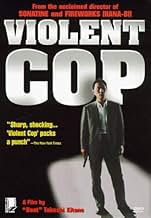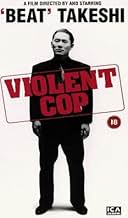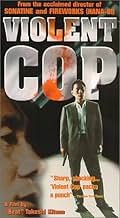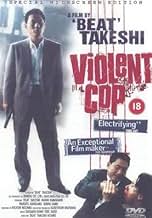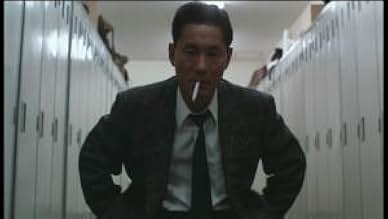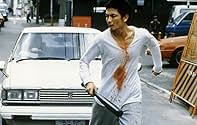AVALIAÇÃO DA IMDb
7,1/10
14 mil
SUA AVALIAÇÃO
Um policial propenso à violência descobre que seu colega trafica drogas.Um policial propenso à violência descobre que seu colega trafica drogas.Um policial propenso à violência descobre que seu colega trafica drogas.
- Direção
- Roteiristas
- Artistas
- Prêmios
- 3 vitórias e 1 indicação no total
Takeshi Kitano
- Azuma
- (as Beat Takeshi)
Sei Hiraizumi
- Iwaki
- (as Shigeru Hiraizumi)
- Direção
- Roteiristas
- Elenco e equipe completos
- Produção, bilheteria e muito mais no IMDbPro
Avaliações em destaque
I find it very difficult to rate a movie like this, as most of its interest is in who made it and how it points to his much superior later movies like Hana-bi. The script here is obviously just a standard actioner - the usual elements we've all seen a million times are there, the hard man cop with his innocent rookie partner, his one weakness (in this case, his sister), his 'no nonsense get things done attitude'. But this being Kitano, its full of mysterious, compelling scenes that in themselves often don't often make sense. The ending was never really in doubt, but the fascination of Takeshi movies is how he gets there. There really is nobody out there making movies quite like him now - such weird blends of Japanese sensibility, American action tropes and European art movie editing and camera-work. It shouldn't work, but somehow it does. Violent Cop is nowhere near his best work so I wouldn't recommend it to anyone curious about watching it, but its certainly worth a view for those who have seen his later movies and want to explore his strange vision of the world.
There is no doubt in my mind that Takeshi Kitano is one of the greatest cinematic geniuses alive, and his nihilistic 1989 directorial debut is a fantastic proof for that. "Sono otoko, kyôbô ni tsuki" aka. "Violent Cop" is one of the rawest, most uncompromising cop films ever made, and, at the same time, arguably one of the most promising debut films ever delivered. Due to its 'unorthodox cop' premise, the film is often compared to films like the "Dirty Harry" series or "Bad Lieutennant". The stone-faced and irascible copper Azuma (brilliant performance by director Kitano, under his acting name 'Beat Takeshi'), is ten times dirtier than Harry ever was and incomparably more ruthless than the Baddest New York Lieutennant. Azuma could even give the ultra-unorthodox coppers in 70s Italian Poliziotteschi flicks a lesson in police violence. At least most violent cops in 70s exploitation cinema did what they did to protect society from scumbags, whilst Azuma does it out of anger, and he does not even bother asking questions before beating confessions out of criminals. Honestly, "Violent Cop" beats everything in the copper-flick field in its incredibly nihilistic premise, and yet it finds the time for slower moments, and Kitano's typically absurd and ingeniously black humor.
Detective Azuma (Kitano), and irascible homicide detective hates the criminal as he hates the crime, and he does not attempt to hide this attitude. His unorthodox methods, which include the severe beating of suspects, have caused him trouble with his superiors in the past, but Azuma does not seem to care. When ruthless Yakuza gangsters make things personal, they have to realize that they might have made an enemy whose relentlessness easily equals theirs...
I would love to further discuss the film's ingenious plot, but I do not want to spoil anything, as every true film lover should be able to experience the greatness of "Violent Cop". Unlike Kitano's other films, for which Kitano himself wrote the stories, this film is an adaptation of a novel by Hiashi Nozawa. Kitano's work, however, is ingenious, as screenwriter, director and leading man of this film. There is no other director who is capable of combining brutal nihilistic violence, tragedy and (black) comedy as effectively as Kitano does. Asked about the violence in his films in an interview, Kitano himself has once stated that nobody could possibly want to reproduce the violence seen in his films, simply because it is painful to look at. And it is true, hardly another director makes the pain caused by the violence as obvious as Kitano does. Kitano has a unique stamina when showing violence, which makes the viewer almost feel the pain. I don't want to spoil anything by giving an example - see this film and know what I am talking about. At the same time Kitano always has moments that are absurdly comical. As all Kitano protagonists, Azuma, even though an irascible and violent man, has a very odd sense of humor. His response to a barmaid's question what he does for a living is just one example for that. Also in a typical Kitano-manner, the film takes the time for slower parts in-between, like Azuma crossing a bridge for example.
Kitano is as great as leading man as he is as director here. His stoic performance as Azuma is brilliant. The stone-faced copper always has a poker face, but it is nonetheless obvious that he is boiling in fury - how many other actors could be predestined for a role like this as Kitano is. No one, in my opinion. It is Kitano's performance which carries this film, and yet the other performances are also excellent. Hakuryu is particularly excellent as a sadistic Yakuza hit-man. Maiko Kawakami is also very convincing as Azuma's mentally disturbed sister. The rest of the cast includes several great character actors who have since become regulars in Kitano's films, such as Ittoku Kishihe as a Yakuza boss or Makoto Ashikawa as Azuma's young colleague. Lovers of Italian cult-cinema, by the way will be delighted to see a scene in which Kitano brilliantly pays tribute to Sergio Martino's Giallo "La Coda Dello Scorpione" (1971). "Violent Cop" is greatly shot and accompanied by an insanely brilliant score. Kitano's use of music in his films is another part of his brilliance, and really has to be experienced instead of explained.
All said, "Violent Cop" is a unique cinematic experience that must not be missed. Ultraviolent, nihilistic, sometimes slow in detail and more often fast and incredibly raw, brutal, sometimes tragic and sometimes oddly comical, this is the uncompromising masterpiece that marks the beginning in the cinematic career of one of today's most brilliant filmmakers. And, apart from his unmatched 1997 masterpiece "Hana-Bi" (aka. "Fireworks"), Kitano's debut still ranks among his greatest accomplishments. A true must!
Detective Azuma (Kitano), and irascible homicide detective hates the criminal as he hates the crime, and he does not attempt to hide this attitude. His unorthodox methods, which include the severe beating of suspects, have caused him trouble with his superiors in the past, but Azuma does not seem to care. When ruthless Yakuza gangsters make things personal, they have to realize that they might have made an enemy whose relentlessness easily equals theirs...
I would love to further discuss the film's ingenious plot, but I do not want to spoil anything, as every true film lover should be able to experience the greatness of "Violent Cop". Unlike Kitano's other films, for which Kitano himself wrote the stories, this film is an adaptation of a novel by Hiashi Nozawa. Kitano's work, however, is ingenious, as screenwriter, director and leading man of this film. There is no other director who is capable of combining brutal nihilistic violence, tragedy and (black) comedy as effectively as Kitano does. Asked about the violence in his films in an interview, Kitano himself has once stated that nobody could possibly want to reproduce the violence seen in his films, simply because it is painful to look at. And it is true, hardly another director makes the pain caused by the violence as obvious as Kitano does. Kitano has a unique stamina when showing violence, which makes the viewer almost feel the pain. I don't want to spoil anything by giving an example - see this film and know what I am talking about. At the same time Kitano always has moments that are absurdly comical. As all Kitano protagonists, Azuma, even though an irascible and violent man, has a very odd sense of humor. His response to a barmaid's question what he does for a living is just one example for that. Also in a typical Kitano-manner, the film takes the time for slower parts in-between, like Azuma crossing a bridge for example.
Kitano is as great as leading man as he is as director here. His stoic performance as Azuma is brilliant. The stone-faced copper always has a poker face, but it is nonetheless obvious that he is boiling in fury - how many other actors could be predestined for a role like this as Kitano is. No one, in my opinion. It is Kitano's performance which carries this film, and yet the other performances are also excellent. Hakuryu is particularly excellent as a sadistic Yakuza hit-man. Maiko Kawakami is also very convincing as Azuma's mentally disturbed sister. The rest of the cast includes several great character actors who have since become regulars in Kitano's films, such as Ittoku Kishihe as a Yakuza boss or Makoto Ashikawa as Azuma's young colleague. Lovers of Italian cult-cinema, by the way will be delighted to see a scene in which Kitano brilliantly pays tribute to Sergio Martino's Giallo "La Coda Dello Scorpione" (1971). "Violent Cop" is greatly shot and accompanied by an insanely brilliant score. Kitano's use of music in his films is another part of his brilliance, and really has to be experienced instead of explained.
All said, "Violent Cop" is a unique cinematic experience that must not be missed. Ultraviolent, nihilistic, sometimes slow in detail and more often fast and incredibly raw, brutal, sometimes tragic and sometimes oddly comical, this is the uncompromising masterpiece that marks the beginning in the cinematic career of one of today's most brilliant filmmakers. And, apart from his unmatched 1997 masterpiece "Hana-Bi" (aka. "Fireworks"), Kitano's debut still ranks among his greatest accomplishments. A true must!
Kitano cripples the senses and jars the nerves in his films. This is a movie about a two-fisted cop whose blunt face and cliff's edge personality drive every scene, even the ones Kitano is not in. Kitano's character is not reacting to a violent world, but infecting it with his own brand of violence. The "violent cop" has lost his hope, therefore he fears nothing.
Kitano as director gives us a real world of humor and interaction. Events happen, there's no plot. Every scene has this pulse that is raging, the characters even when still seem kinetic as sprinters. Punches, kicks, and bullets explode bodies. Kitano's character clashes with a psychotic hit man, but it is Kitano's cop who is out of control, unstoppable in his desire to inflict justice as he sees it.
There's scenes which cannot be forgotten: Kitano's cop
interrogates a punk drug dealer in a club rest room. These two actors go through a scene in which Kitano slaps this man over and over until he talks. The difference is that Kitano is really slapping this actor, and slapping living hell out of him. Cringe-worthy, and up there with one of the other scenes that illustrates what a hard man Kitano is: stabbed with a knife, Kitano grips the blade as it comes out of him, clinching his fist down on it so he cannot be stabbed again. Blood pours out from between his fingers, he cannot let it go because his fist and knife are one; Kitano understands the brutality of the fight, the reality of two men trying to kill each other, no quips, no words, no yells or curses, just blood and rage; cut to the bone, it's the way the whole film makes you feel.
As far as the recent BROTHER is concerned, it makes perfect sense for Kitano to use similar themes seen in his earlier films. BROTHER is Kitano's first real attack on American audiences. They, en mass, haven't seen his stuff, and if Kitano's going over old ground, he's doing it in HIS style. Better a retread Kitano than most of Hollywood's slobbering star-cramped idiocy.
Kitano as director gives us a real world of humor and interaction. Events happen, there's no plot. Every scene has this pulse that is raging, the characters even when still seem kinetic as sprinters. Punches, kicks, and bullets explode bodies. Kitano's character clashes with a psychotic hit man, but it is Kitano's cop who is out of control, unstoppable in his desire to inflict justice as he sees it.
There's scenes which cannot be forgotten: Kitano's cop
interrogates a punk drug dealer in a club rest room. These two actors go through a scene in which Kitano slaps this man over and over until he talks. The difference is that Kitano is really slapping this actor, and slapping living hell out of him. Cringe-worthy, and up there with one of the other scenes that illustrates what a hard man Kitano is: stabbed with a knife, Kitano grips the blade as it comes out of him, clinching his fist down on it so he cannot be stabbed again. Blood pours out from between his fingers, he cannot let it go because his fist and knife are one; Kitano understands the brutality of the fight, the reality of two men trying to kill each other, no quips, no words, no yells or curses, just blood and rage; cut to the bone, it's the way the whole film makes you feel.
As far as the recent BROTHER is concerned, it makes perfect sense for Kitano to use similar themes seen in his earlier films. BROTHER is Kitano's first real attack on American audiences. They, en mass, haven't seen his stuff, and if Kitano's going over old ground, he's doing it in HIS style. Better a retread Kitano than most of Hollywood's slobbering star-cramped idiocy.
It's nearly impossible not to watch 'Violent Cop' without thinking of Kitano's masterpiece 'Hana-bi' ('Fireworks'). As the latter is a brilliant achievement and one of the most outstanding movies of recent years, Japanese or otherwise, 'Violent Cop' must obviously be slightly disappointing in comparison. Many of Kitano's subsequent themes and style are evident in slightly embryonic form here, only not quite as successfully handled. A lot of that has to do I'd guess with Kitano having no involvement with the sometimes pedestrian script. Even so, that's not to say that 'Violent Cop' is a bad movie, far from it! It may not be Kitano's best work, but personally I enjoyed this one much more than his recent attempt at a Hollywood crossover 'Brother'. Kitano is one of the most charismatic actors currently working and every time he's on screen he is mesmerizing. He plays a tough cop with unconventional methods who finds himself caught between loyalty and duty when he discovers that one of his fellow cops is in cahoots with some local drug pushers. When his beloved sister is kidnapped, doped up and raped by members of this gang it's inevitable that he will seek his revenge. The title of the movie gives a very clear message of how he plays the game! This is probably a great place to start for newcomers to Kitano, especially those who are anticipating some kind of Woo/Lam Hong Kong action-fest. Kitano's yakuza movies are very different in approach, slower, more thoughtful and with much greater depth. I'm not a fan of Hong Kong cop movies as to me they are all style and very little substance. This is certainly not the case with 'Violent Cop' or Kitano's subsequent movies in a similar vein. It may take some a little time to grow accustomed to their style and approach, but once you have I'm sure you'll be hooked like I am. If you enjoyed this movie run immediately to your local video/DVD outlet and rent 'Hana-bi'. You will be amazed!
A shallow description would refer to this as a Japanese version of Dirty Harry. And it does bear some resemblance to that film, but while Dirty Harry broke the rules in order to get a criminal at any cost, Kitano's character Azuma seems to seek vengeance due not only to his lust for revenge but because he's psychotic. There's a sense that Azuma won't rest until he gets his man not out of duty but out of madness. Kitano gives what might be his best performance in this film; he is absolutely riveting. And the film itself is beautifully shot, and the score is especially good. But the best part of this is perhaps the end - the film ends on a perfectly cynical note that couldn't be topped. Seek this out.
Você sabia?
- CuriosidadesTakeshi Kitano insisted on long takes. Close-ups easily lasted 10 seconds, medium shots went on for 20 seconds and the shot where Azuma (Kitano) walks onto the bridge and into the frame lasted 57 seconds.
- Erros de gravaçãoBoom mic visible from behind a car at 49:28 as Iwaki approaches Azuma.
- Citações
Azuma: Turn yourself in tomorrow.
Delinquent Kid: I didn't do anything!
Azuma: You didn't do anything?
[Rams kid's head into the wall.]
Azuma: Well, then I didn't do anything either!
- Cenas durante ou pós-créditosThere are no opening credits beyond the title.
- Versões alternativasWhen the film was released in Swedish cinemas in 1992, it was censored with a little more than one minute for violence, the cuts were made in the following scenes:
- The policeman getting assaulted before he gets his head crushed by a baseball bat.
- The scene where Azuma assaults Hazishume on the toilet, and the finger cutting sequence.
- The following cuts are when Azuma assaults the killer in the locker room and a bloody execution scene at the end.
- ConexõesFeatured in Sete Psicopatas e um Shih Tzu (2012)
- Trilhas sonorasGnossienne No.1
(1890)
Main theme is an electronic variation of the above title by Erik Satie
Arranged by Daisaku Kume
Performed by Daisaku Kume
Produced by Kazuyoshi Okuyama
Courtesy by Vap Inc.
Principais escolhas
Faça login para avaliar e ver a lista de recomendações personalizadas
- How long is Violent Cop?Fornecido pela Alexa
Detalhes
Bilheteria
- Faturamento bruto nos EUA e Canadá
- US$ 1.960
- Tempo de duração1 hora 43 minutos
- Cor
- Proporção
- 1.85 : 1
Contribua para esta página
Sugerir uma alteração ou adicionar conteúdo ausente

Principal brecha
By what name was Policial Violento (1989) officially released in Canada in French?
Responda


